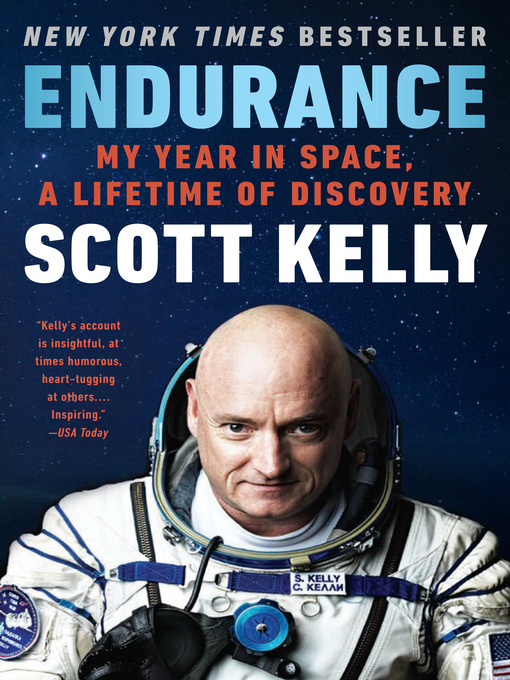
Endurance
A Year in Space, A Lifetime of Discovery
فرمت کتاب
ebook
تاریخ انتشار
2017
Lexile Score
1140
Reading Level
8-9
نویسنده
Scott Kellyشابک
9781524731601
کتاب های مرتبط
- اطلاعات
- نقد و بررسی
- دیدگاه کاربران
نقد و بررسی

August 15, 2017
A four-time veteran of off-planet missions, including a year aboard the International Space Station, offers a view of astronautics that is at once compelling and cautionary.Why go into space in the first place? Kelly ponders that existential question early on, the whys and wherefores of entering into the strangest of strange environments and potentially suffering all manner of consequences. He replies, "I have a few answers I give to this question, but none of them feels fully satisfying to me." Among those answers, perhaps, are because it's extremely exciting to go where no one--very few people, anyway--has gone before, and after all, Kelly still holds the American record for consecutive days spent in outer space. Naturally, that comes at a cost; his book opens with an alarming portrait of edema, rashes, and malaise, and hence another answer emerges: we can't go to, say, Mars without understanding what space flight does to a human body. Some of Kelly's descriptions seem a little by-the-numbers, the equivalent of a ball player's thanking the deity for a win--a spacegoing colleague is "sincere and enthusiastic without ever seeming fake or calculating," while a Russian counterpart is "a quiet and thoughtful person, consistently reliable." Nonetheless, Kelly's book shines in its depiction of the day-to-day work of astronautics and more particularly where that work involves international cooperation. On that score, there's no better account of the cultural differences between Right Stuff-inculcated NASA types and Yuri Gagarin-inspired cosmonauts: "One difference between the Russian approach to spacewalking and ours," he writes, "is that the Russians stop working when it's dark." It's fascinating stuff, a tale of aches and pains, of boredom punctuated by terror and worries about what's happening in the dark and back down on Earth. A worthy read for space buffs, to say nothing of anyone contemplating a voyage to the stars.
COPYRIGHT(2017) Kirkus Reviews, ALL RIGHTS RESERVED.

September 15, 2017
Inspired by Tom Wolfe's book The Right Stuff (1979), Kelly became a navy pilot and astronaut. Before retiring from NASA, he earned the record for the most total time spent in space, including 340 consecutive days at the International Space Station. This memoir is filled with stories of the daring, patience, and humanity necessary to be an effective leader in space, along with the stress of being away from family. His brother Mark Kelly is also a retired astronaut; Scott tells of hearing about the 2011 shooting of his sister-in-law U.S. congresswoman Gabrielle Giffords, from afar and subsequently leading a moment of silence in honor of the victims. While Kelly's story is personal, it's also a cautionary tale about the future of space exploration, especially if deeper investment is not made. VERDICT Kelly's down-to-earth personality, humor, and blog SteveKelly.com have earned him a devoted following. Highly recommended to anyone who has an interest in memoirs or space travel.--Beth Dalton, Littleton, CO
Copyright 2017 Library Journal, LLC Used with permission.

Starred review from October 23, 2017
Kelly, a former astronaut who spent a record-setting year aboard the International Space Station (ISS), shares his experiences of space travel in this fascinating memoir. He shifts between the many aspects of his year-long project (“As much as I worked on scientific experiments, I think I learned at least as much about practical issues of how to conduct a long-range exploration mission”) and his early life. After growing up influenced by Tom Wolfe’s The Right Stuff, he pursued a career as a fighter pilot, a test, pilot, and finally an astronaut. Throughout, Kelly gives the reader a sense of what life is like inside the ISS, where there are “rooms upon rooms, each of which serve different purposes, its own equipment and hardware, and its own feeling and smell.” He is unsparing in detailing the danger that “space junk” presents to the space station (“If the satellite hits, the resulting destruction would be... akin to a nuclear explosion”), but he also often displays a sense of humor, especially when describing his capsule’s reentry into Earth’s atmosphere (“As soon as you realize you’re not going to die, it’s the most fun you’ll ever have in your life”). His is an inspirational story of true endurance under pressure.

Starred review from September 1, 2017
It's no minor point that astronaut Scott Kelly chose as his book's title the name of the ship Ernest Shackleton used for his expedition to cross the Antarctic almost exactly a century before Kelly climbed aboard the International Space Station, which he would call home for the next year. Like Shackleton, Kelly was proposing to do what no one had ever done before, and, like Shackleton, he had no idea what challenges were in store for him, both during his extended stay in space and back home on Earth. He tells his story in chapters that alternate between his life before the year in space (a born risk-taker, he was a poor student until he read Tom Wolfe's The Right Stuff and discovered what he was meant to do with his life) and his life aboard the ISS. For space junkies, it's absolutely required reading. The narrative vividly captures Kelly's growing excitement and trepidation as he prepares to spend a year living in an environment where the potential for catastrophe or death is a part of daily life, and once he's aboard the space station, we feel as though we're right there with him. A great book.(Reprinted with permission of Booklist, copyright 2017, American Library Association.)

























دیدگاه کاربران